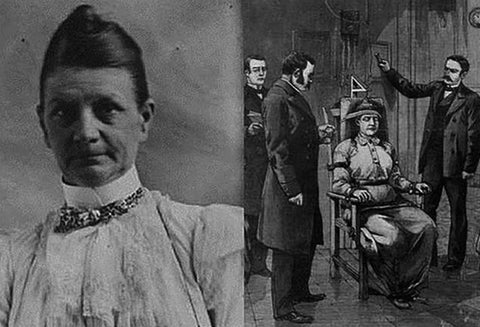Top Stories

FEATURED ITEM

In the annals of criminal history, few cases are as chilling and tragic as that of Martha Place. On a fateful day, February 7, 1898, the peaceful atmosphere inside a Brooklyn home was shattered by a violent argument between Martha and her husband, William. What ensued was a sequence of events that would lead to a horrifying crime and an unprecedented execution method. This blog post delves into the haunting story of Martha Place, exploring the details of the crime she committed, her high-profile trial, and the unique circumstances that led to her execution by electric chair—a historical first for a woman.
Amidst the rising tension during their argument, William abruptly stormed out, leaving a seething Martha behind. Overwhelmed by anger and seeking solace or perhaps revenge, Martha turned to Ida, William's teenage daughter, who had taken her father's side during the dispute. However, Ida's act of slamming the door in Martha's face proved to be the catalyst for an unimaginable tragedy.
In a moment of unfathomable rage, Martha reached for a bottle of acid from William's desk and callously hurled it at Ida's face. The corrosive liquid inflicted immense pain and disfigured the young girl irreversibly. Yet, the horror did not stop there. Driven by her murderous impulses, Martha smothered Ida to death using her own bedding, transforming the once peaceful home into a macabre crime scene.
Martha's actions did not end with the murder of Ida. Armed with an ax, she lay in wait for William's return, determined to exact further vengeance. As William ascended the steps to their brownstone that evening, Martha launched a vicious attack upon him. Miraculously, William managed to escape, raising the alarm and summoning help. The authorities swiftly arrived at the scene, only to be confronted by a harrowing sight.
Inside the house, they discovered the lifeless body of Ida, her eyes disfigured from the acid attack, and blood streaming from her mouth. The gruesome scene sent shockwaves through the community, leaving an indelible mark on the collective memory.
Martha Place's swift apprehension led to a highly publicized trial that captivated the public's attention and fueled widespread outrage. The jury, presented with the horrifying details of Martha's crimes, deemed her actions so heinous that they unanimously sentenced her to death.
However, what made Martha's case particularly noteworthy was the method chosen for her execution: the electric chair. Historically, this method had never been employed to execute a woman before. The decision sparked intense debate and added an element of controversy to the already sensationalized trial.
The tragic tale of Martha Place serves as a grim reminder of the depths to which human emotions can descend. Her crime, marked by acid, murder, and the groundbreaking use of the electric chair for execution, etched a dark chapter in the annals of criminal history. Martha Place's story not only highlights the catastrophic consequences of uncontrolled rage but also underscores the evolving nature of punishment within society.
Decades have passed since those chilling events, yet the impact of Martha's crimes lingers. The story serves as a haunting cautionary tale, urging us to reflect on the depths of human depravity and the importance of justice. Martha Place's name remains forever linked to a shocking crime that challenged societal norms and continues to fascinate those who delve into the darkest corners of criminal history.
By exploring the story of Martha Place, we gain insight into the complexities of human behavior and the consequences of unchecked emotions. As we navigate the present, her story reminds us of the importance of empathy, understanding, and the pursuit of justice. The haunting tale of Martha Place serves as a cautionary reminder of the depths to which we can sink when driven by rage and the need for retribution.
In the end, Martha Place's legacy is a somber one, forever etched in the annals of criminal history. Her story serves as a stark reminder of the fragility of the human psyche and the harrowing consequences that can arise from unchecked emotions. As we reflect on her actions, may we strive to cultivate empathy, seek justice, and prevent the repetition of such tragedies in our modern society.
In the annals of criminal history, few cases are as chilling and tragic as that of Martha Place. On a fateful day, February 7, 1898, the peaceful atmosphere inside a Brooklyn home was shattered by a violent argument between Martha and her husband, William. What ensued was a sequence of events that would lead to a horrifying crime and an unprecedented execution method. This blog post delves into the haunting story of Martha Place, exploring the details of the crime she committed, her high-profile trial, and the unique circumstances that led to her execution by electric chair—a historical first for a woman.
Amidst the rising tension during their argument, William abruptly stormed out, leaving a seething Martha behind. Overwhelmed by anger and seeking solace or perhaps revenge, Martha turned to Ida, William's teenage daughter, who had taken her father's side during the dispute. However, Ida's act of slamming the door in Martha's face proved to be the catalyst for an unimaginable tragedy.
In a moment of unfathomable rage, Martha reached for a bottle of acid from William's desk and callously hurled it at Ida's face. The corrosive liquid inflicted immense pain and disfigured the young girl irreversibly. Yet, the horror did not stop there. Driven by her murderous impulses, Martha smothered Ida to death using her own bedding, transforming the once peaceful home into a macabre crime scene.
Martha's actions did not end with the murder of Ida. Armed with an ax, she lay in wait for William's return, determined to exact further vengeance. As William ascended the steps to their brownstone that evening, Martha launched a vicious attack upon him. Miraculously, William managed to escape, raising the alarm and summoning help. The authorities swiftly arrived at the scene, only to be confronted by a harrowing sight.
Inside the house, they discovered the lifeless body of Ida, her eyes disfigured from the acid attack, and blood streaming from her mouth. The gruesome scene sent shockwaves through the community, leaving an indelible mark on the collective memory.
Martha Place's swift apprehension led to a highly publicized trial that captivated the public's attention and fueled widespread outrage. The jury, presented with the horrifying details of Martha's crimes, deemed her actions so heinous that they unanimously sentenced her to death.
However, what made Martha's case particularly noteworthy was the method chosen for her execution: the electric chair. Historically, this method had never been employed to execute a woman before. The decision sparked intense debate and added an element of controversy to the already sensationalized trial.
The tragic tale of Martha Place serves as a grim reminder of the depths to which human emotions can descend. Her crime, marked by acid, murder, and the groundbreaking use of the electric chair for execution, etched a dark chapter in the annals of criminal history. Martha Place's story not only highlights the catastrophic consequences of uncontrolled rage but also underscores the evolving nature of punishment within society.
Decades have passed since those chilling events, yet the impact of Martha's crimes lingers. The story serves as a haunting cautionary tale, urging us to reflect on the depths of human depravity and the importance of justice. Martha Place's name remains forever linked to a shocking crime that challenged societal norms and continues to fascinate those who delve into the darkest corners of criminal history.
By exploring the story of Martha Place, we gain insight into the complexities of human behavior and the consequences of unchecked emotions. As we navigate the present, her story reminds us of the importance of empathy, understanding, and the pursuit of justice. The haunting tale of Martha Place serves as a cautionary reminder of the depths to which we can sink when driven by rage and the need for retribution.
In the end, Martha Place's legacy is a somber one, forever etched in the annals of criminal history. Her story serves as a stark reminder of the fragility of the human psyche and the harrowing consequences that can arise from unchecked emotions. As we reflect on her actions, may we strive to cultivate empathy, seek justice, and prevent the repetition of such tragedies in our modern society.
Related Articles

The Audacity of Valerio Viccei: A Million-Dollar Heist and a Fall from Grace

The Legacy of Joey 'the Clown' Lombardo: Unmasking a Notorious Chicago Mobster

Infamous Infancy: The Rise and Fall of Baby Face Nelson

The Helicopter Heist: Redoine Faid's Daring Prison Escape Shakes the World

Caught in the Ink: How Social Media Exposed a Yakuza Boss in Thailand

Notorious Reign: The Ruthless Legacy of Baby Face Nelson
Newest Releases
SHOP THE COMPLETE OMERTA STOREFEATURED ITEM
MOST POPULAR
ADVERTISMENT




















